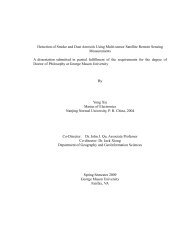Shifting Alliances in the Accreditation of Higher Education: On the ...
Shifting Alliances in the Accreditation of Higher Education: On the ...
Shifting Alliances in the Accreditation of Higher Education: On the ...
You also want an ePaper? Increase the reach of your titles
YUMPU automatically turns print PDFs into web optimized ePapers that Google loves.
discourage pollution s<strong>in</strong>ce <strong>the</strong> cost <strong>of</strong> <strong>the</strong> pollution—environmental damage and health<br />
risks—is not usually borne by those produc<strong>in</strong>g <strong>the</strong> pollution. 12<br />
The alleged efficiency <strong>of</strong> market solutions depends on certa<strong>in</strong> assumptions be<strong>in</strong>g<br />
made; <strong>in</strong> particular, <strong>the</strong>re must be ―low transaction costs, perfect <strong>in</strong>formation, and <strong>the</strong><br />
absence <strong>of</strong> collective action problems.‖ 13 Fur<strong>the</strong>r, <strong>the</strong> efficiency that results from market<br />
solutions does not necessarily satisfy distributional concerns. That is, overall efficiency<br />
may be achieved without government regulation <strong>in</strong> certa<strong>in</strong> cases, but this <strong>of</strong>ten overlooks<br />
distributive consequences that may fur<strong>the</strong>r dim<strong>in</strong>ish efficiency, not to mention basic<br />
values such as fairness.<br />
Government regulation may also be used to deal with collective action problems,<br />
as when workers are unable to organize to <strong>in</strong>sist on safety rights. 14 Collective action<br />
problems are not unique to labor, however; firms may face collective action problems<br />
result<strong>in</strong>g from <strong>the</strong> need to rema<strong>in</strong> competitive by ma<strong>in</strong>ta<strong>in</strong><strong>in</strong>g low costs. For example,<br />
firms may f<strong>in</strong>d <strong>the</strong>mselves unable to pursue costly, but environmentally responsible,<br />
policies unless <strong>the</strong>y can be certa<strong>in</strong> that <strong>the</strong>ir competitors are do<strong>in</strong>g <strong>the</strong> same. In such a<br />
case, <strong>the</strong>re must be some uniform set <strong>of</strong> standards that is be<strong>in</strong>g imposed upon all firms<br />
with<strong>in</strong> <strong>the</strong> <strong>in</strong>dustry, as well as a reliable system <strong>of</strong> monitor<strong>in</strong>g and enforc<strong>in</strong>g those<br />
standards. 15<br />
12<br />
L<strong>in</strong>dblom, The Market System, 147-153.<br />
13<br />
Kenneth W. Abbott and Duncan Snidal, ―International ‗Standards‘ and International Governance,‖<br />
Journal <strong>of</strong> European Public Policy, 8:3 (2001): 348.<br />
taylorandfrancis.metapress.com/<strong>in</strong>dex/8CFAP21MMLYP5R3U.pdf<br />
14<br />
Ibid., 349-350.<br />
15 Ibid., 353.<br />
17


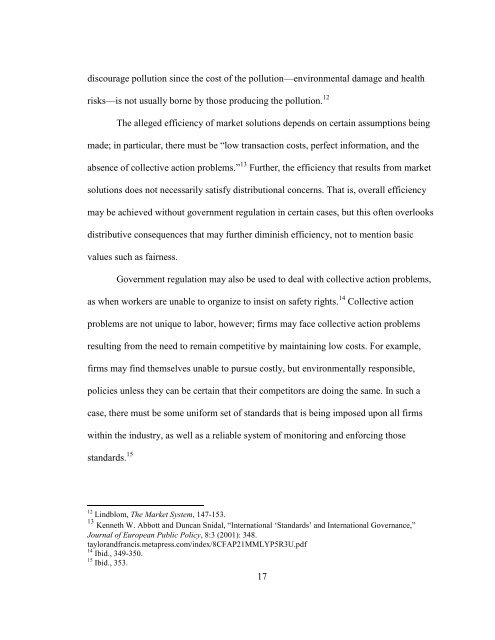
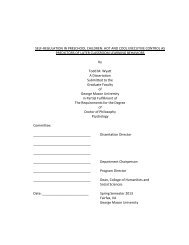
![[Sample B: Approval/Signature Sheet] - George Mason University](https://img.yumpu.com/21978828/1/190x245/sample-b-approval-signature-sheet-george-mason-university.jpg?quality=85)
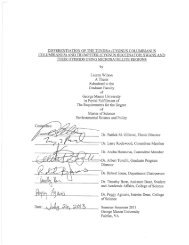
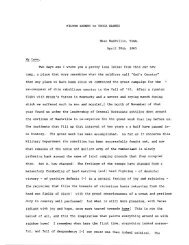
![[Sample B: Approval/Signature Sheet] - George Mason University](https://img.yumpu.com/18694905/1/190x245/sample-b-approval-signature-sheet-george-mason-university.jpg?quality=85)
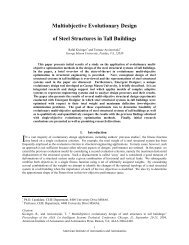
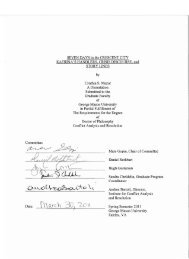

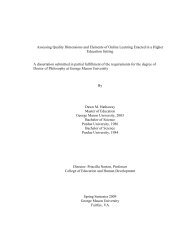

![[Sample B: Approval/Signature Sheet] - George Mason University](https://img.yumpu.com/18694552/1/189x260/sample-b-approval-signature-sheet-george-mason-university.jpg?quality=85)
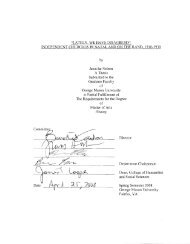
![[Sample B: Approval/Signature Sheet] - George Mason University](https://img.yumpu.com/18694474/1/190x245/sample-b-approval-signature-sheet-george-mason-university.jpg?quality=85)
